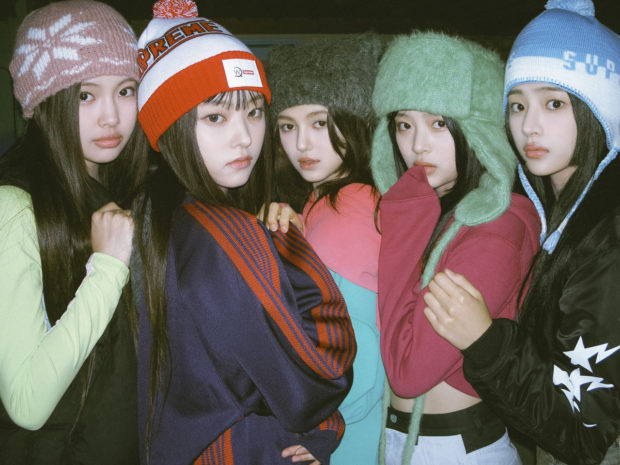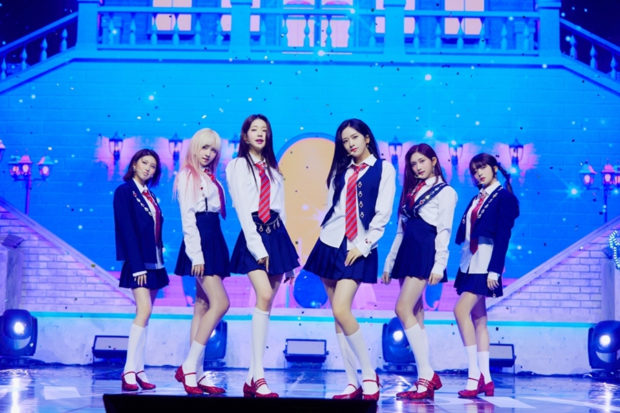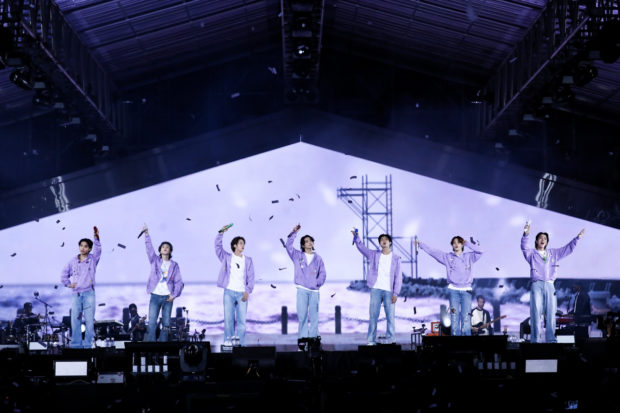From BTS enlistment to reign by new girl groups: 2022 K-pop wrap up

NewJeans (Ador) via The Korea Herald / ANN
This year has opened up a new chapter for K-pop. Rookies have stepped up, with girl groups excelling beyond all. BTS ended the long discussion on the seven members’ conscription with Jin’s December enlistment. Long-awaited comebacks came as the end of the prolonged virus pandemic nears, with some surprise returns making a splash.
The K-pop market itself is expanding fast. The top 400 albums sold 74 million copies as of last week, up 30 percent from 2021, Circle Chart (previously, Gaon Chart) said in its report. The report also added that the global sales of K-pop albums is expected to see a record high this year.
With less than a week left to 2022, here’s a wrap up of the year’s most defining trends.

K-pop group Ive (Starship Entertainment) via The Korea Herald / ANN
Rookie girl groups reign above all
We knew K-pop girl groups were big, but this year showed that is almost an understatement. From Ive to NewJeans, fourth-generation bands have made full-fledged debuts, shooting straight to stardom.
Ive topped the charts with every release. After making a smash debut in December 2021 with single “Eleven,” the group nabbed the million-seller title with its third single “After Like.” Only a year into its debut, the group swept the year-end music awards, bagging both the rookie of the year and the coveted best song prizes at the Melon Music Awards and the Mama Awards this year.
Le Sserafim — an anagram of “fearless” — proved their name was no joke. It was hard for these girls from the start, debuting in May as Hybe’s first girl group and losing a member in just two months. Le Sserafim came back stronger as a quintet, placing its second EP “Antifragile” at No. 14 on the Billboard 200 main album chart upon its release. It entered the chart the fastest among all K-pop girl groups.
Hybe’s second girl group, NewJeans, brought new momentum to K-pop. The muse of K-pop’s legendary visual director Min Hee-jin, now the head of label Ador, NewJeans was a phenomenon even before its official debut in August. The four songs on its debut EP “New Jean” topped the charts, with the album racking up 200 million streams on Spotify in the shortest time among all K-pop albums in history. The latest release “Ditto” also shot to the top of local and global music platforms as soon as it dropped, raising the anticipation for their upcoming second album “OMG” set for a Jan. 2 launch.
It’s not just the rookies from the big labels that flourished. Project girl group Kep1er that debuted in January from the TV audition show “Girls Planet 999” made a splash debut in both Korea and Japan, and went onto grab the Platinum Certification from the Recording Industry Association of Japan with its debut single “Wa Da Da.”

Blackpink (YG Entertainment) via The Korea Herald / ANN
Million-seller queens
Physical album sales used to represent the size of fandoms, and “million-seller” was a title reserved only for the boy bands with troops of global fans — until last year.
This year, not only did we see the first female million-selling group in K-pop history, four other groups also reached that same milestone soon after.
SM Entertainment’s four-piece aespa became the first female group to rack up sales of one million copies with a single album. Its second EP, “Girls,” released in July, racked up a total of 1.8 million copies. Twice, JYP Entertainment’s frontman group in its seventh year, garnered its first million copies with its eleventh EP, “Between 1&2” dropped in August, while the label’s Itzy earned the title with its fifth EP “Checkmate.” Ive reached the milestone faster than anyone with its third single, “After Like,” which tallied sales of 1.6 million even before the act’s first anniversary.
Leaping beyond all was Blackpink, who nabbed the first double million-seller title with its second studio album “Born Pink.” Returning with a new album for the first time in almost two years, the girls notched up a total of over 2.14 million copies with “Born Pink” in less than a week, Circle Chart data showed, more than double the record set by its previous studio album, “The Album,” in 2020.
A total of 10 female groups have racked up 1 million in accumulated sales this year, including Red Velvet, Le Sserafim, (G)I-dle, NMIXX and Kep1er.

BTS holds a concert via The Korea Herald / ANN
BTS begins second chapter
This year is probably one of the biggest turning points in BTS’ history. For the first time in its nine-year career, the seven-piece decided to let each member pursue separate paths.
In June, the boy band announced an official halt to group activities and said the members will now begin a new chapter which centers around each of their individual lives and careers. The shock announcement came a few days following the release of the group’s ninth anniversary anthology album “Proof.”
Since its debut in 2013, BTS has ran relentlessly forward, pushing the ceiling endlessly higher. It has set unprecedented records in K-pop history, such as the industry’s first Billboard Hot 100 No. 1 with “Dynamite” in 2020, the first Grammys nomination and the first win of a grand prize at the American Music Awards. However, they felt they were missing out on their individual lives, and the second chapter will be devoted to realizing more personal dreams and plans they each had, the members explained.
J-Hope was the first among the members to go solo. In July, he dropped his first solo EP “Jack In the Box,” and went onto make his solo debut at a US festival with the album at Lollapalooza. He also took the stage at the 2022 Mama Awards in November, attending the ceremony alone for the first time.

BTS’ Jin posts a selfie with short hair on Weverse on Mon. (Yonhap)
Up next was Jin and RM. Jin teamed up with Coldplay for his digital single “The Astronaut” dropped in October. RM released a 10-track album, “Indigo,” in December, sharing his story with the world.
Although not with an official album, Jung-kook, the team’s youngest, is attempting new projects without his bandmates. In July, he teamed up with Charlie Puth on the American singer-songwriter’s single “Left and Right.” In December, he featured on the 2022 Qatar World Cup’s line-up of original soundtracks, dropping “Dreamers” and performing the song at the opening ceremony. He was the first South Korean musician to release a World Cup song and perform it at an overseas event.
The sudden rush of individual activities by BTS members comes as the long-prolonged discussion on their military enlistment ended this year. Since 2018, the lawmakers and the government have been mulling an exemption or an alternative service for the boy band for its exceptional contribution to the country, a special treatment given to classical musicians and athletes but not K-pop artists.
Jin was able to postpone his duties at the recommendation of the culture minister until the age of 30, but a full exemption did not come through for him. Jin, announcing his enlistment in October, began his service on Dec. 13 in the Army. The six other bandmates are also set to take up their duties according to plan, Big Hit Music said.
Return of old school
Many groups have come and gone in K-pop’s short history, but not many were able to make a permanent return. We’ve seen some groups, like H.O.T and Fin.K.L, gathering for special commemorative events for fans, but rarely could any stay the course.

Kara (RBW, DSP Media) via The Korea Herald / ANN
This year was different, with a stream of long-loved first and second generation groups making full-fledged comebacks.
Kara, on Nov. 29, dropped its 15th anniversary album “Move Again.” It was the first album from the group in over seven years since the group dropped its seventh EP, “In Love” in 2015, before the death of Goo Hara. The album was an instant hit. The girls had their comeback stage at the 2022 Mama Awards in Osaka, and the album topped several major local music charts, and even notched No. 1 on Line Music’s music video Top 100 in Japan.
One of the top-tier groups in the late 2000s to early 2010s, Kara had once reigned the music scene in not just South Korea but also Japan, releasing hits on end, including “Pretty Girl,” “Honey,” “Mr.,” “Lupin” and “Jumping.” It was the first K-pop group to launch a standalone concert at the Tokyo Dome, Japan’s biggest stadium.
Their comeback was a momentous occasion, as Kara’s comeback meant more than just an album. In an industry where even the top names can be pushed out of the limelight so easily, Kara’s return success meant there was hope for other groups as well.
Several others — even artists that had separated under different agencies — followed suit.
In March, boy band GOT7 dropped its first album together since the members left JYP in 2020. The members, who had denied rumors of disbandment, returned with the album “Got7” to proclaim their new start together. Girls’ Generation also dropped its 15th anniversary album “Forever 1” in August, returning as a full eight-piece after years on hiatus.

Cover image of BigBang’s album via The Korea Herald / ANN
In April, Big Bang returned with “Still Life,” its first single in over four years. The beleaguered former member Seungri was off the list, and the song seemed to mark a new start for the four members. Once a low-profile superstar, G-Dragon has been spotted in public more often recently. News is out that T.O.P will be flying to the moon with a Japanese entrepreneur, while rumors say Taeyang will be coming back as a singer next year in collaboration with BTS’ Jimin.
Recently, g.o.d from the first generation made a miraculous comeback with a sold-out concert. The group got together to hold its 23rd anniversary concert, “2022 god ON,” in Seoul, for the first time in four years.